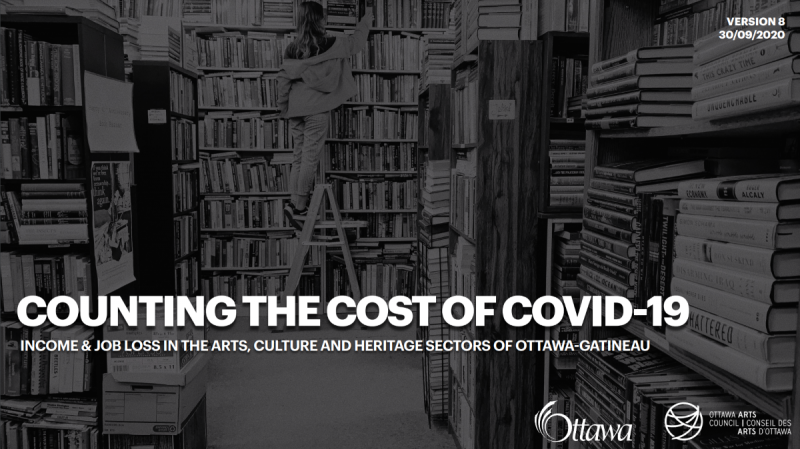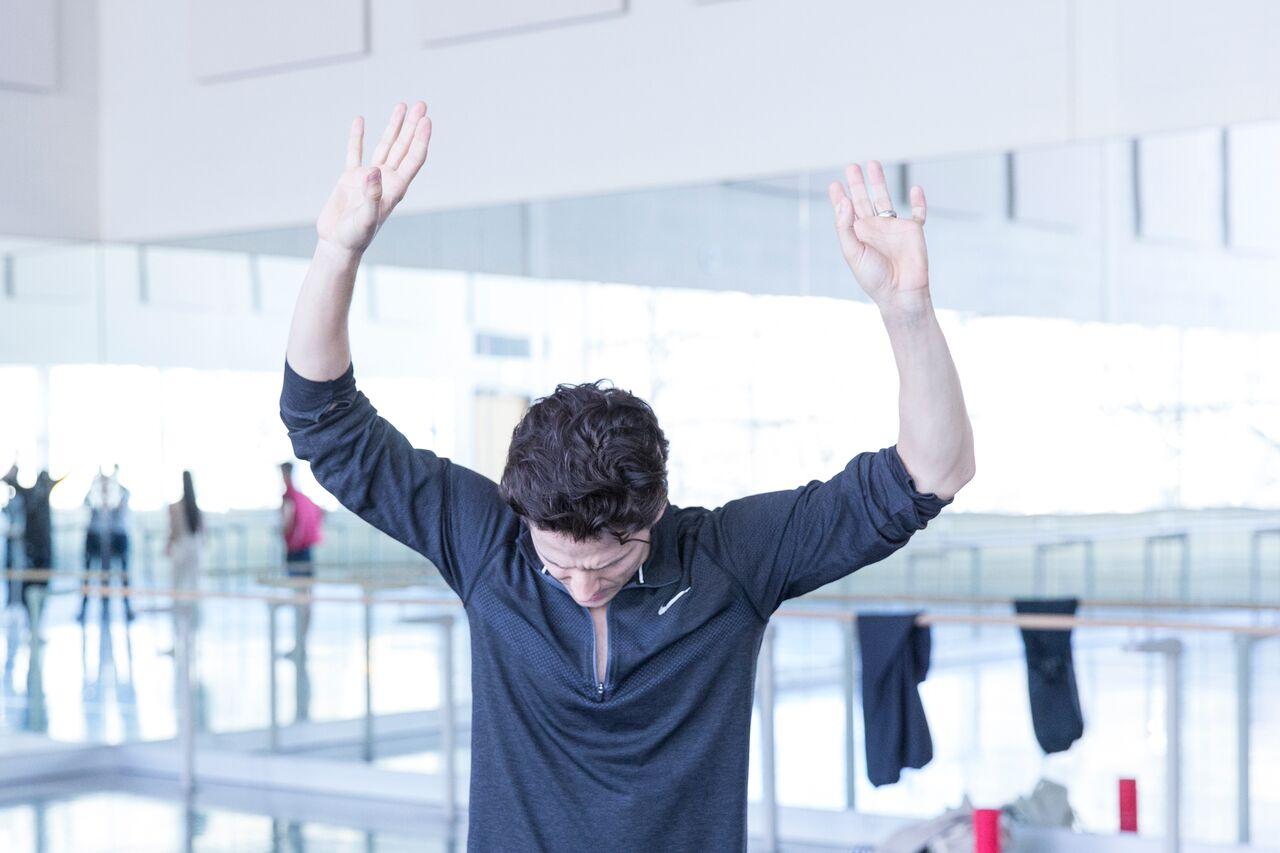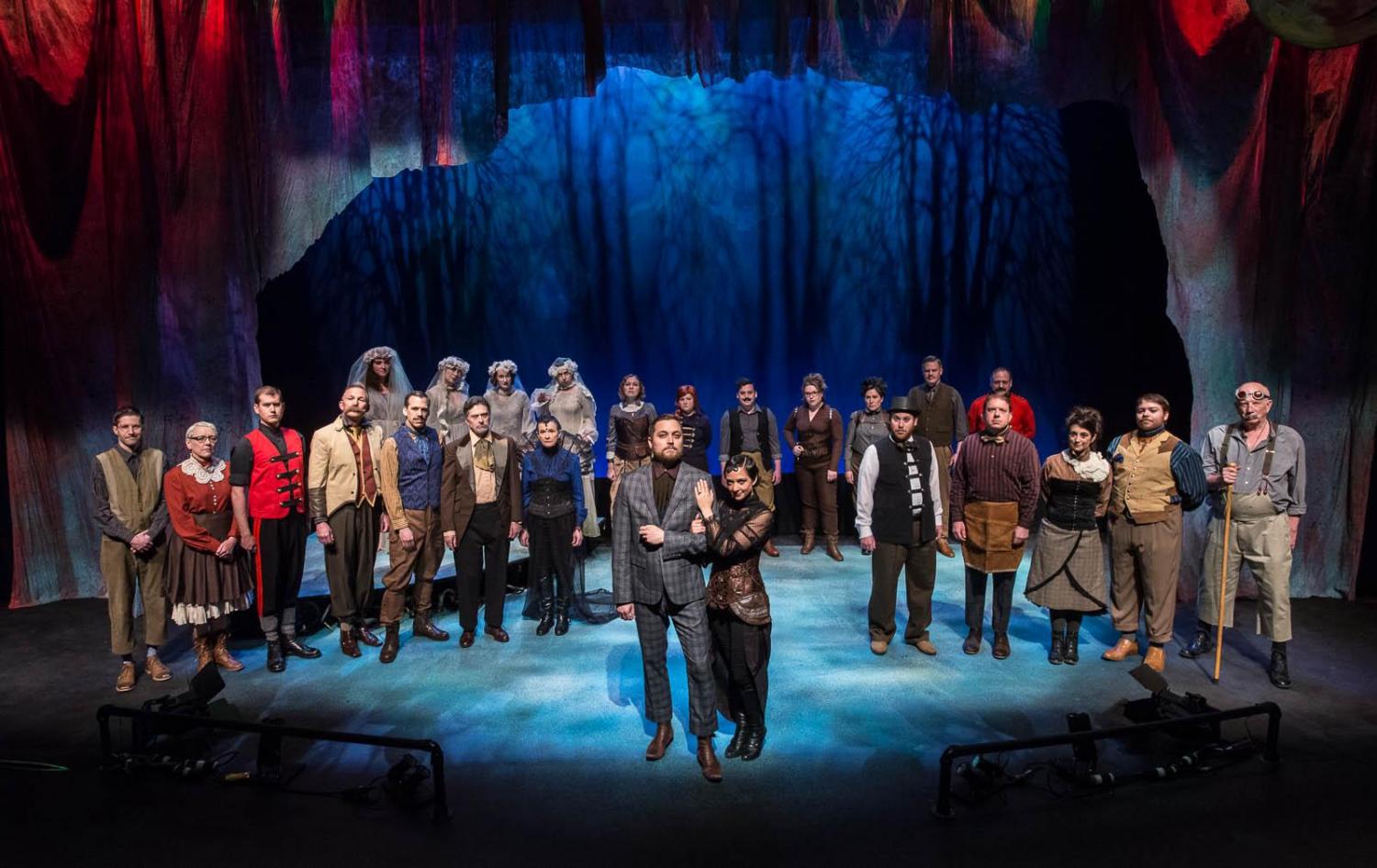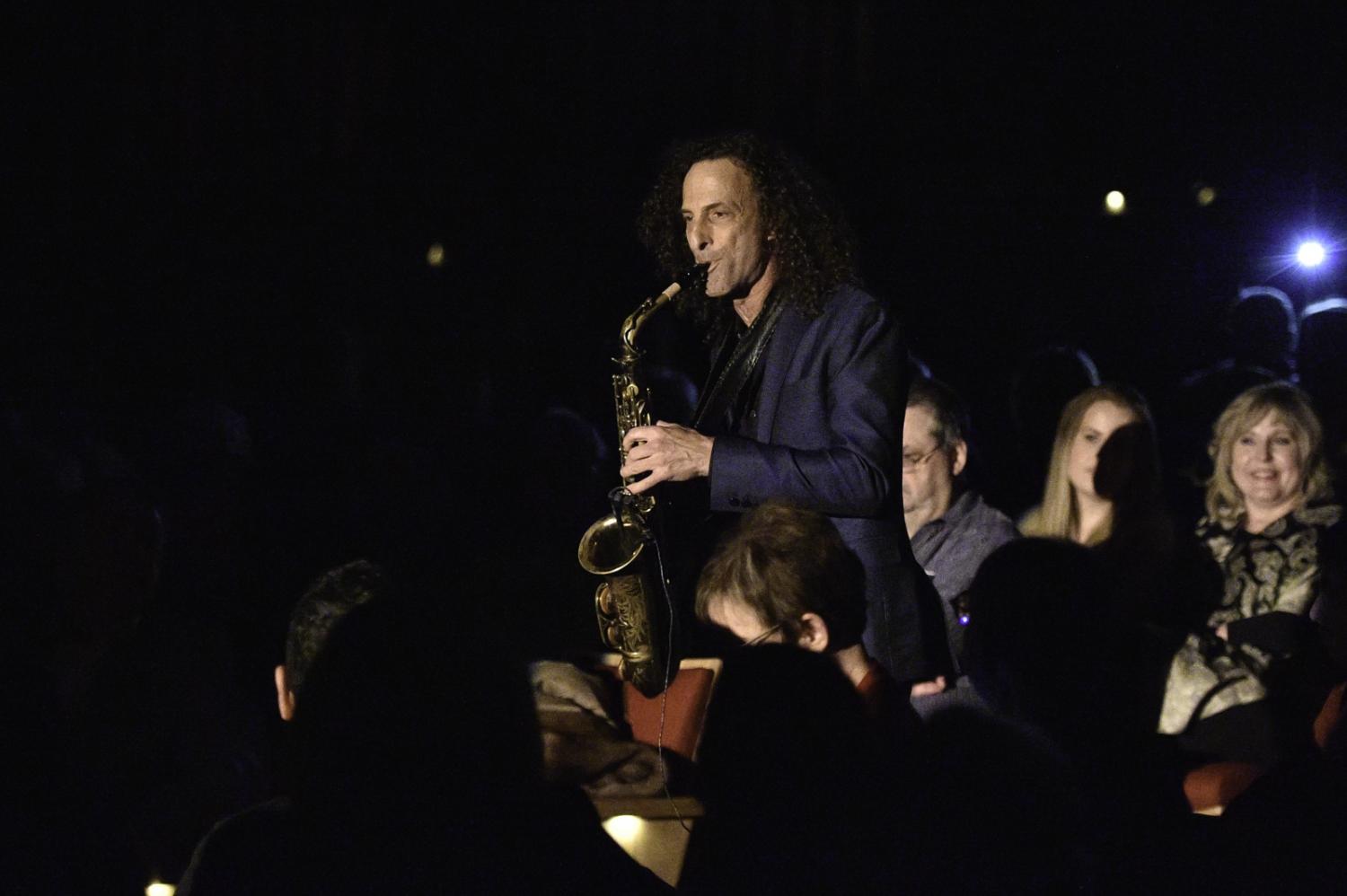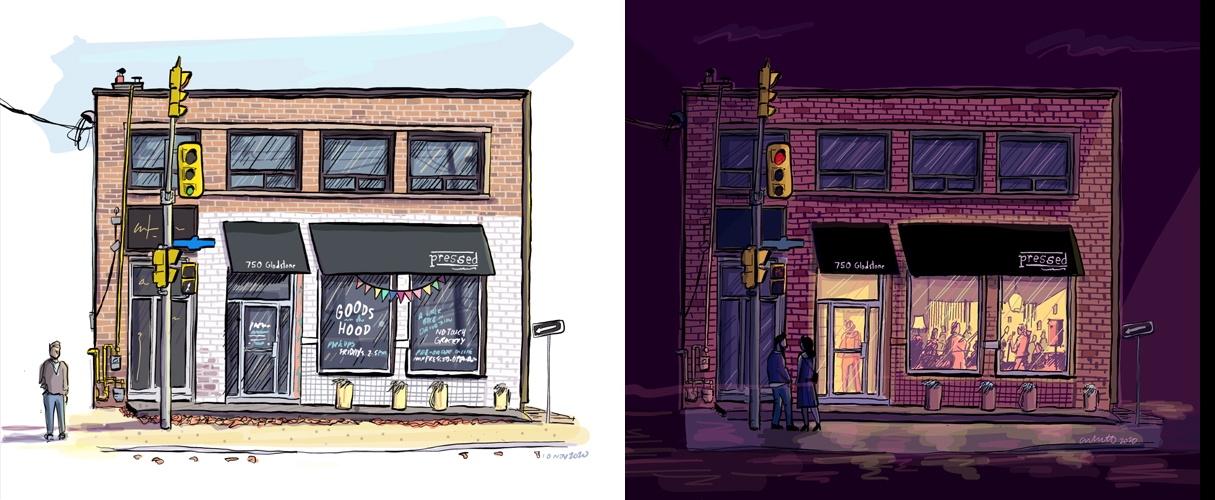
Centretown’s Pressed: Gone but not forgotten
Above: Whether stopping in for an afternoon coffee or checking out a band at night, Pressed will be missed by all Ottawans. ILLUSTRATIONS BY COLIN WHITE
Another pillar of the Ottawa arts scene has shuttered.
And in many ways, we are left with more questions than answers.
Centretown’s Pressed, the popular café, bar, live music venue, community gathering space and labour of love that owner-operator Karie Ford called her second home, joins Hintonburg’s Cinqhole as recent casualties of the ongoing crisis.
Ford grasped the proverbial baton from Jeff Stewart in 2016 and never looked back.
“Live music, totally in love, I wanted to carry that on and build that up,” she said. “That, and just the community involvement, the inclusive space, I just thought that he (Stewart) had created such an amazing, amazing place, and I was fortunate I feel to have the opportunity to keep that intact and build on it.
“I think over the last four years, we just had become even more of a presence in the community and supporting all sorts of non-profit, small organizations, grassroot organizations.”
Unfortunately, Ford couldn’t have foreseen what was coming in 2020.
“It was definitely a viable business,” she explained. “Margins are always slim in the restaurant industry, but yeah we were able to give back to the community.
“I was in the position to support other things and give money to Mealshare and we supported Ecology Ottawa, did a few programs with them, we were doing fine. The place had legs, there’s no question.”
There’s also no question that Ford attempted everything she could to keep Pressed going.
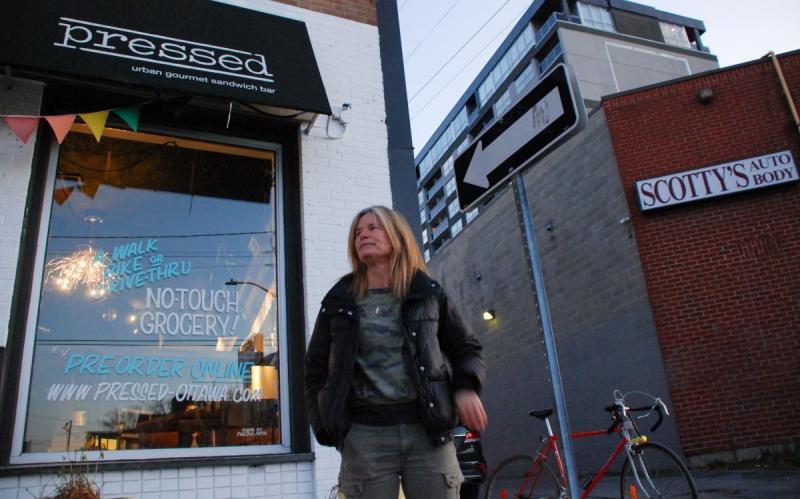
Goods in the Hood, the improvised grocery store she ran on her own through April and May, became a success in that it provided cash flow and meant bills could be paid. It also eventually allowed some staff to return to work.
“At that time, those first couple of months, I really think that people were really nervous about going to grocery stores and the long lineups and that sort of thing,” Ford said. “The grocery store was a really good pivot for us.”
Take-out options came along and patio service catered to patrons through the warmer months.
On the surface, a sense of normalcy had returned.
But closing down was always in the back of her mind, Ford admitted.
“I had a hard time with my landlord, and honestly it just became a constant up and down,” she said. “You’re dealt this set of cards and so you roll with it and you adapt and you come up with a solution how you’re going to make this work and get excited and energized about it and roll it out, and then it felt like every couple days that all blew up.
“This whole past seven and a half months, it (closing) was a distinct possibility but I definitely wanted to give it a shot and you know it’s Pressed, it’s got to survive right?”
Much of what made Pressed what it was for Ford and many others was the live music.
Creating and holding space for the artistic community became a raison d’être.
“That was fuel for Pressed, for as much as that helped other people, we loved doing that sort of thing,” she said. “And it just kind of became a bit of a slog. I feel like the financial was the main thing, but also it became a bit of a burnout.
“There were only so many times I could rally and come up with a new plan and be innovative and be excited about it and then have another unpleasant experience with my landlord, and then the numbers are going up and we’re closed again. It was really just super draining.”
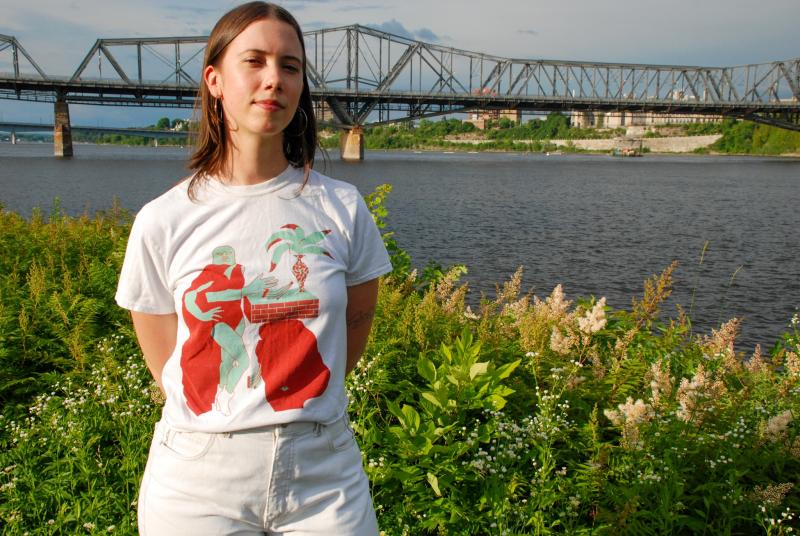
Debaser, an arts organization and event presenter/producer based in the Ottawa-Gatineau region, had been utilizing 750 Gladstone Avenue as an event space since launching in 2013.
“I feel really sad and I feel like I took it for granted because it was one of the longer standing, maybe like the longest standing independent underground music space that had a really great spirit for supporting and welcoming emerging artists,” Rachel Weldon, director of Debaser, said. “I just don’t know that there has been anything quite like Pressed in Ottawa that has been around for as long as they have.
“It’s such an important size room for emerging artists to get their start and touring artists to play their first or one of their first Ottawa shows. I think it really filled the gap that I wasn’t even aware it was filling for the last few years because I think I was just so used to it being there.”
The story of Pressed is indeed a microcosm of the bigger picture.
This unravelling of the fabric of the arts community is a worrying trend and something the City of Ottawa in partnership with the Ottawa Arts Council has been tracking since March.
“It’s a really tender time,” the Ottawa Arts Council’s Marisa Gallemit said. “I feel like somebody used this analogy the other day that you’re building the bridge you’re trying to cross in real time.
“We’ve had the closure of Cinqhole in September, Pressed and those kinds of small businesses are at the mercy of provincial safety guidelines and there’s really nothing that can be done about that. All of these places are accessing the rent relief and the wage subsidy, they’re all doing the things they’re supposed to be doing, it’s just a tough one.”
The arts and artists alike have always been a resilient bunch.
One of the big questions that remains is whether the government will heed the call for help.
“I’m getting a lot of feedback that the industry needs the government at all levels to recognize that the arts and culture and heritage sectors are professional sectors and that they deserve the supports that are available to all the other quote unquote essential sectors,” Gallemit explained. “By and large, a lot of arts workers are not feeling that, a lot of arts workers are feeling a little bit left out and left high and dry, in particular the smaller businesses who are having to give it up because they can’t make rent because they don’t really have a pivot.
“A lot of these spaces are driven by a passion for performance and theatre and improv and comedy, and the fact they’re purveyors of bar service or food service is sort of incidental to having to generate revenue.”
As the pandemic goes, so too will the government’s balancing act between economic considerations and public safety guidelines. It makes for a rollercoaster of a ride for people trying to stick it out and make a buck in business and in the arts.
That said, the outpouring of community, for buying and supporting local, is something that should provide us all with hope, an essential ingredient for today’s world.
“I think there is intentionality with how people are spending their money right now,” Gallemit said. “There is a real mindfulness when it comes to spending your dollars locally and that is happening in Ottawa and I think it’s really meaningful to a lot of people that showing of support in whatever way you can, even if you don’t want to gather, that I think is really heartwarming and I think it’s really indicative of a very tight knit arts and culture community.”
For those wanting to learn more about the economic impact of COVID-19 on Ottawa-Gatineau artists and cultural workers, the City of Ottawa’s Cultural Development and Initiatives Unit alongside the Ottawa Arts Council will be hosting a virtual session on Wednesday, November 25th at 5:00pm as part of ARTPRENEUR 2020 (https://www.eventbrite.ca/e/artpreneur-conference-2020-day-3-tickets-126300240419).
Photos by Luke Barry

